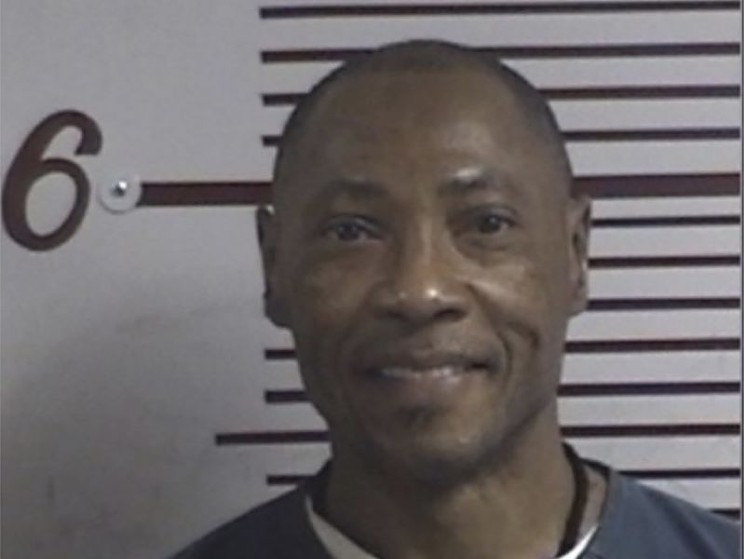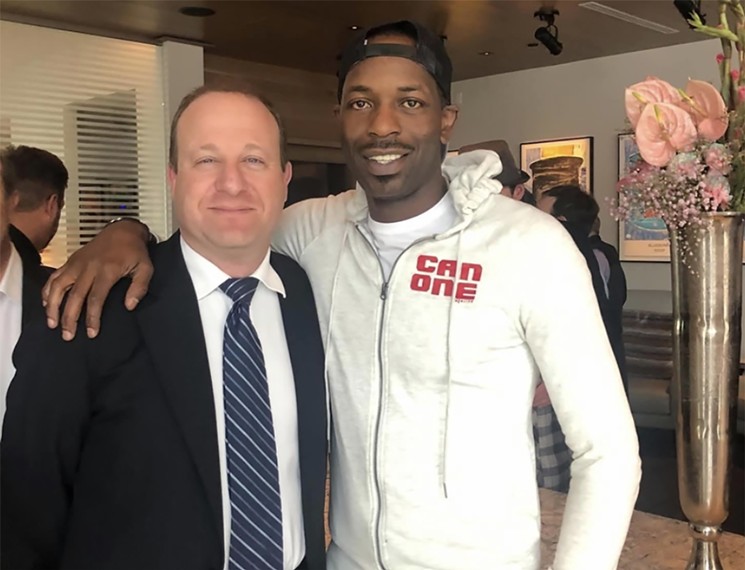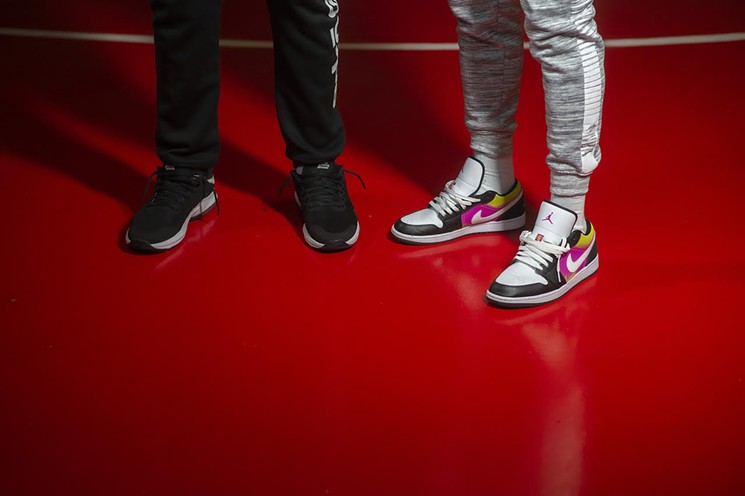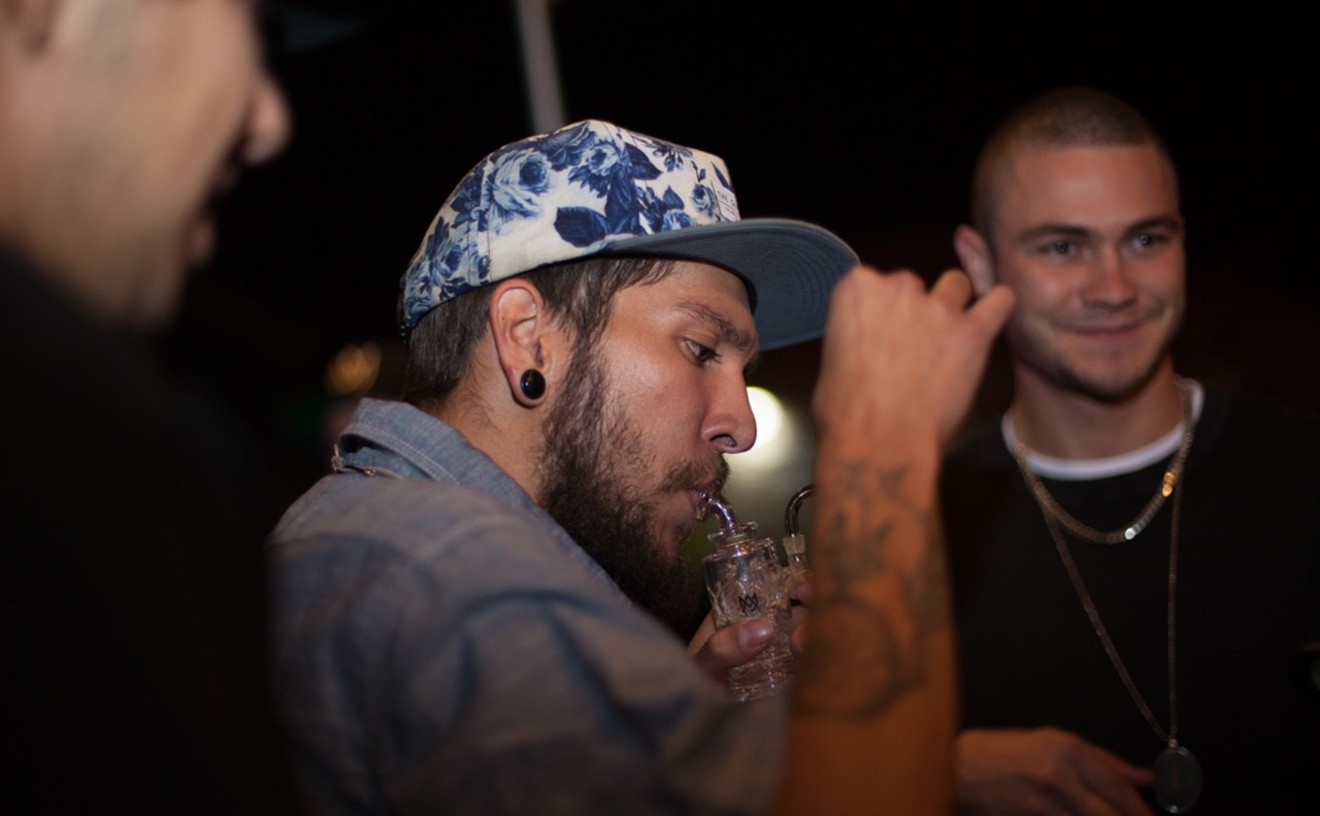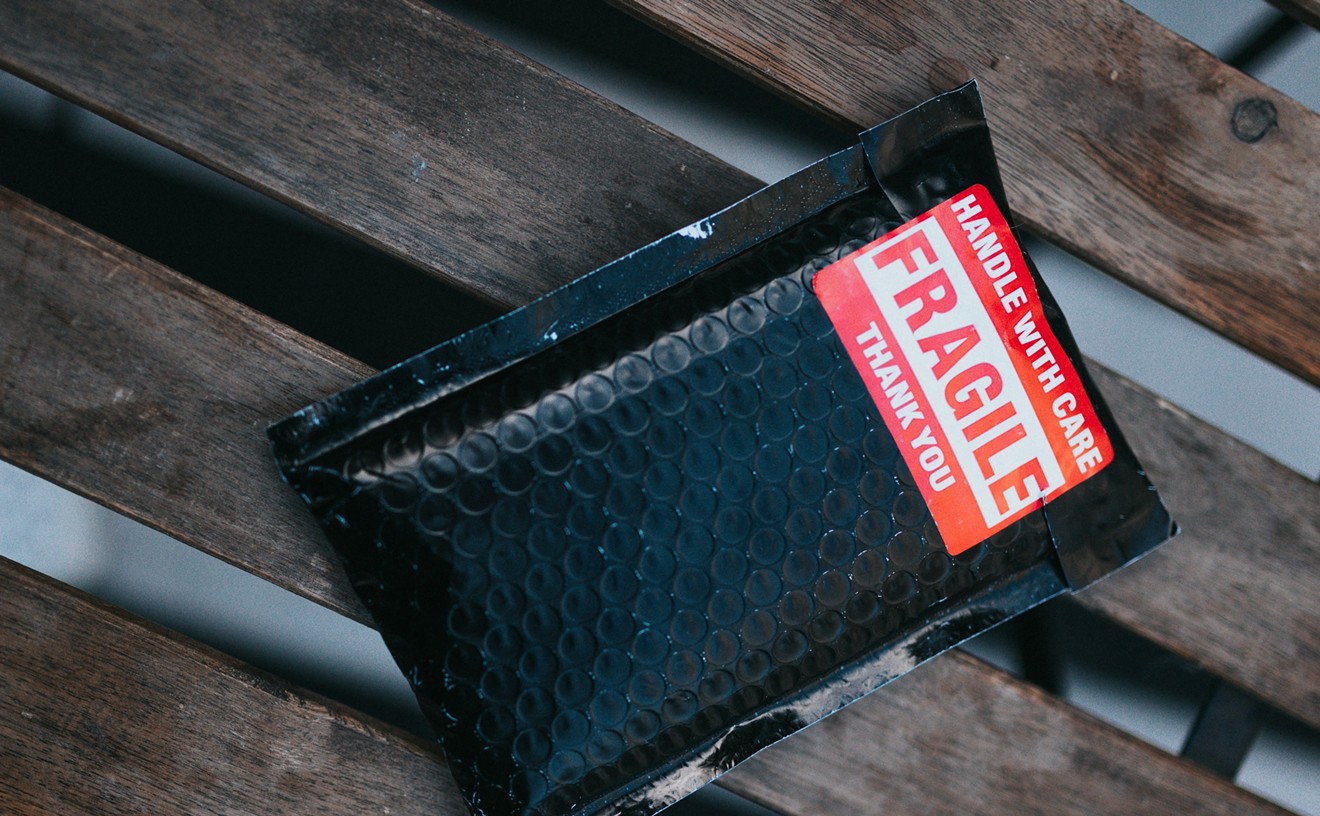With his father back in his life, there was no limit to what he could do.
For most of Lewis’s childhood, Fred Harris hadn’t had much of a relationship with his son. In fact, they didn’t meet until Lewis was five. Harris lived in a different home in Denver — when he wasn’t in jail. But he was out when Lewis’s game started taking off, and basketball offered a chance for the two to reconnect over shared talent. A chance to grow together. A chance at a relationship.
A towering presence at 6’4”, Harris had played a semester of college ball in Texas before dropping out of school. Now he could reach his son in ways that others couldn’t, sticking an elbow in Lewis’s back and swatting his shots away one moment, pumping him up the next. Lewis was already tough, but as his sessions with his father continued, he showed new self-determination and faith in himself.
But then Harris vanished. When Lewis finally found out where his father was and how long he would be gone this time, it “felt like he died,” he remembers.
Charged with possession of 4 ounces of cocaine in Denver, Harris had expected a slap on the wrist. Maybe ten years, max. Defense attorneys estimated something closer to twelve years. But prosecutors played off Harris’s past cannabis convictions, and the judge sentenced him to 96 years in prison.
Born to a fifteen-year-old in west Texas, Fred Harris was more of a friend than a son to his mother and was raised by his grandparents. He excelled at sports and, big for his age, came into his own athletically as a teenager.
He was offered a scholarship to play basketball at a small college in Abilene, Texas. There he was introduced to Rastafari religion and culture, and began using cannabis frequently.
“They’d talk about the concrete feeling the vibrations of our feet, and I thought it was deep,” Harris remembers with a smile. “That introduced me to the concept of marijuana. I’d reference King Solomon’s grave and quote the Bible after smoking weed.”
He stopped eating meat and abstained from drinking, but he also stopped going to class, and dropped out of school before his second semester. “I liked the basketball,” he says. “The academic side, I wasn’t really into that. I didn’t have a father figure, and I didn’t realize what it took to be successful.”
He bounced around Texas, then came to Denver in the early ’80s to live with relatives and look for work. That’s when he met Cheryl. They soon had a son, then Lewis. But the relationship with Cheryl didn’t last as Harris traveled back and forth between Texas and Colorado.
Harris moved to Denver permanently in 1987. Before work and during shift breaks at the Fairmont Hotel, he started pushing weed as a side hustle, selling $20 bags at Civic Center Park.
In 1988, Harris was pulled over on a bicycle with an ounce of weed in his backpack, but he avoided jail time. In 1993, he picked up a pound on the west side with hopes of flipping it fast, but on the way home, he was pulled over by Denver police, who smelled the poorly concealed pot. “They said my car was rattling from my music, and that’s why they pulled me over,” Harris recalls with an eye roll. “It’s the only thing I knew. I didn’t look at it as if it were wrong. It was just weed.” That time, he went to jail."I didn't view myself as having a criminal habit. I just had a habit of selling drugs."
tweet this
Harris was arrested again in 1994 for criminal marijuana possession, and received eighteen months in prison. By now, he felt like being a drug dealer was his only way to make a living.
“I didn’t view myself as having a criminal habit. I just had a habit of selling drugs,” Harris explains. “Now you see all these people making money off it.”
He eventually moved on to dealing cocaine to make more money, and ended up with more problems. He was set up twice by police during his coke-dealing career, arrested in sting operations both times. The cocaine charges, on top of three marijuana possession convictions, earned him a dreaded label for any Black man in the United States court system: habitual offender.
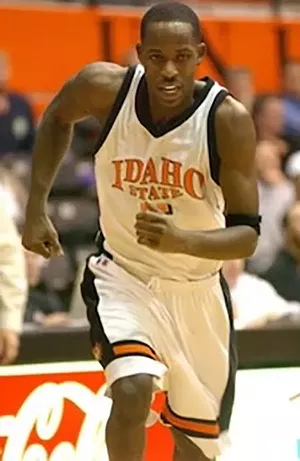
After winning a state championship, Arzelle Lewis played four years at Idaho State.
Courtesy of Arzelle Lewis
“They were raising ten, fifteen kids. Everyone’s kids — my mom’s kids, my auntie’s kids, my other auntie’s kids,” Lewis says. “My grandparents kept a roof over my head. My coaches kept me in check.”
His grandparents worked hard to support their growing household, but there wasn’t much extra money. Lewis remembers turning red with embarrassment after a classmate made fun of his shoes, a source of pride for any boy looking up to Michael Jordan, in front of his grade-school crush.
But when Lewis was in the third grade, Harris bought him a pair of Air Jordans for his birthday. The memory is so strong in Lewis’s brain that he remembers going to the now-closed Buckingham Square Mall in Aurora to get them.
Lewis became one of the best players of his age group in Denver the following year, and the Jordans helped spark a lifelong passion for shoes. But his father’s visits faded away for several years.
“I was coming from a lifestyle and not knowing what it takes to be a father. I thought some money and shoes was what it took to be a father. Drop some money and shoes off — I thought that’s what a father was,” Harris says. “But it’s not. It was a selfish lifestyle.”
When his father disappeared, Lewis tried making some money on his own. Selling candy didn’t bring in enough extra money to keep up with ’90s fashion trends, though.
“When I was twelve,” he recalls, “I was made fun of again for my shoes, so I stole crack cocaine from my auntie, and the next morning I’m in the Five Points trying to sell drugs. These three Crips come out of nowhere and beat the shit out of me. One of them cocked a gun in my face, and I told them I was twelve. They thought I was seventeen.”
When he learned that Lewis was a basketball player trying to sell crack for shoes, the Crip with the handgun put the piece back in his pocket and pulled out a wad of cash. He gave Lewis a couple hundred dollars and told him to be back there in an hour with new shoes on his feet, or else.
After that, Lewis’s new neighborhood friend kept an eye on him; recognizing his potential at basketball, he rejected the notion of him gangbanging with the group.
“He saved my life. I respected him. He was the big fish in the neighborhood,” Lewis says. “He was killed during my freshman year in college. His goal was to get me out of here. He was an OG Crip at 21. They found him dead in his car later on. To this day, people don’t know how he got killed.”
Stories like that were common in Five Points in the ’90s, according to Lewis, who grew up with people like Brian Hicks, the leader of the Tre Tre Crips convicted in 2006 of soliciting men to kill a court witness, and Bruce Mingo, one of Lewis’s high school teammates, who was convicted of murdering a cab driver in 1999.
His father reappeared just before Lewis started high school. “When I was in eighth grade, we hung out about ten times, because he lived down the street from my middle school,” Lewis says, recalling time spent with his dad the way most children remember family vacations. Then Harris drifted away again, and Lewis reverted to relying on his grandparents, coaches and local gangsters for guidance. Without their support and basketball, Lewis might have adopted a drug-dealing lifestyle similar to his father’s, he says, except “I would’ve been better than him.”
His father made a brief reappearance during Lewis’s junior year in high school, when he gave him basketball tips, but he soon disappeared again. It took weeks for Lewis to find out that Harris had been arrested, and months — until after he’d graduated from East — to find out how long his father would be locked up. With a 96-year sentence, Lewis knew he might not see his father again.
He pressed on with basketball, and took advantage of a full ride to Idaho State.
One day during his sophomore year of college, a friend of Lewis’s living in his former house called and said some mail had been delivered to his old address. It was a letter from his father, reaching out for the first time since he’d been imprisoned.
“We talked a couple times in college on the phone. It hit me really hard,” Lewis says. “What do you do? I didn’t know any lawyers. I was just trying to get through college, and didn’t know anything about the world.”
The 6’3” point guard didn’t let his father’s incarceration derail his college experience, and he worked his way into consistent playing time and a starting position. Lewis was a feared defender in the back court, with enough stamina to feast on weak dribbling and lazy passes from opposing guards who dared to get tired on his watch. He played well enough to earn an invite to an NBA pre-draft camp in 2005.“We were getting cool when my dad got locked up, and I feel like that took away from my basketball career."
tweet this
But no longer in college and now a broke graduate from a small school, Lewis found himself without a coach, agent or father. He never averaged more than six points a game in college as a defensive player, and the odds were already stacked against him. His support system gone, the second-guessing returned when he was playing against tougher competition.
“We were getting cool when my dad got locked up, and I feel like that took away from my basketball career,” Lewis says. “I was always second-guessing myself. I was always jealous of my friends when I’d see them with their dads. … I could’ve made the NBA just off defense. I was a good point guard, and I was fast. I could’ve made it in the league.”
Lewis continued attending workouts while keeping a home base in Denver, but he never got a call from the NBA. He played professionally for several seasons in Australia, Japan and China, however — and while that’s not exactly LeBron James money, it’s still a good living. But by 2012, he was ready to retire from the game and mulling his future. Law school was an option.
“I had friends in law school, and they said I could be a good lawyer. And I wanted to get my dad out,” he says.
Instead of going to law school, though, Lewis spent the last of his basketball savings launching a sports publication, BAC Magazine (short for Become a Champion), working with the likes of NBA super-dad LaVar Ball and Pro Basketball Hall of Famer George Gervin. That was just the start of his entrepreneurial activities. A few years later, he founded a nonprofit, SweetFeet, that donates shoes to underprivileged kids in Colorado and California.
But he never gave up on freeing his father.
Colorado had just ended its prohibition on recreational cannabis when Lewis retired from basketball, and the natural defender was ready to take his fight to another court.
“There are people in prison who deserve a second chance,” he explains. “My dad wasn’t perfect, but if he did what he did today, he would’ve gotten eight years or drug court. It’s hard, because I did everything on my own. And I didn’t want to see anybody be stuck in prison for something that other people are making money off of.”
Plenty of people have made money off of marijuana since it was legalized in the state in 2012. Nearly $10 billion in legal cannabis products have been sold in Colorado since recreational sales began in January 2014. Andy Williams, co-founder of Medicine Man dispensaries and several other cannabis companies, is one of those who’s made money, as well as connections that he was happy to use.
After being introduced to Lewis through mutual friends, Williams became a sponsor of BAC Magazine and helped fund some of Lewis’s community work, including youth basketball camps and SweetFeet. The two became friends, and one night over dinner in 2018, shortly after Jared Polis was elected governor, Lewis shared his father’s story with Williams.
Polis has been a supporter of the legal cannabis industry since his days as a U.S. congressman, and Williams was one of many cannabis business owners who donated to his gubernatorial campaign — enough, in his case, to get an invite to an intimate post-election dinner with Polis and his staff.
“I told Arzelle he’d be my plus-one,” Williams recalls.
The idea was to mention Harris’s case to the incoming governor in hopes of securing a pardon or clemency. But first, Williams called Ean Seeb, a friend who is also the governor’s cannabis policy adviser, to get the ball rolling.
“I told him Lewis’s story and what I’d planned to do at this thank-you event, and asked him if he’d bring it up,” Williams says of his call with Seeb. “He told me it was his second day on the job. But then he paused for a moment and told me he’d see what he could do.”
So Williams and Lewis went to the governor’s dinner, and waited in an elevator lobby for Polis to arrive. While most people bring up their causes or interests after the standard handshake and photo opportunity, Williams’s plus-one didn’t waste any time.
“I kinda hit him with it, and said something like, ‘Hey, man, my dad’s eligible for clemency, and you should let him out,'” Lewis recalls. “Andy was the first person I went to. He said he’d get me a meeting with the governor, and he got me a meeting with the governor.”
But a five-minute meeting can only go so far, especially when you’re asking for something as complicated as a pardon or clemency. And several missteps along the way made things even more complicated.“I kinda hit him with it, and said something like, ‘Hey, man, my dad’s eligible for clemency, and you should let him out.'"
tweet this
“I initially requested a pardon, and not clemency, so that added an extra six months to the application time,” Lewis recalls. “Then we found out my father had already applied for clemency in 2015, but his case manager didn’t file it.” That led to more delays.
Williams would get infrequent calls from the governor’s office to talk about Harris’s application status and relay them to Lewis, but as time went on, the calls became less and less frequent.
Just a year after Polis took office, the pandemic broke out. Harris was still in prison, and Lewis was losing hope.
With a July 2020 deadline for Harris’s next clemency application approaching, Lewis realized they needed professional help. His father told him about a Denver attorney whose law firm was working with prisoners and the American Civil Liberties Union on prison conditions during the pandemic.
Criminal defense attorney Erica Grossman almost referred Harris’s case to someone else when Lewis approached her. It was her first clemency case, and she had just three weeks to clean up the application. While Grossman had worked in similar pro bono areas, representing detainees of Guantánamo Bay in 2008 and working with the ACLU on various civil rights and prisoner rights cases, all that experience had taught her that any clemency application is a long shot, no matter how qualified the candidate.
And Harris was qualified in her eyes. The activities that led to at least one of his cannabis possession charges would likely have been legal under today’s laws, and the state penalties for Harris’s other crimes have been reduced since he was sentenced. Today the maximum penalty he could have received for his cocaine conviction is 24 years, and Grossman thinks it would have been eight years or less, based on similar cases and court precedent.
The factors involved with a clemency application go beyond an unfair sentence, however; they include a prisoner’s behavior record and where he will land in society upon his release. Harris had displayed good behavior in prison and was a low risk for recidivism, according to his case manager; he also had a home with Lewis and a job at SweetFeet waiting for him.
“That, mixed with the fact that Governor Polis ran on cannabis legalization — I think all of those factors made [Harris] an ideal candidate,” Grossman says. “There was this feeling it was going to work based on everyone who touched it. It just kept going the right way.”
Grossman believed enough in Harris’s case that she asked another former Colorado congressman (whom she declines to name) to write a letter to Polis in support of Harris.
“You have a 57-year-old man in the middle of a pandemic serving a lengthy sentence for selling drugs in the ’90s, a sentence that was so harsh for something that is now an essential service in Colorado,” she explains.
“But there are other ideal candidates who are overlooked on a daily basis, and my colleagues would say that all the time about clemency.”
Even with an ideal candidate, it’s common to wait years for a clemency application to be recommended by the state Executive Clemency Advisory Board or signed by the governor, Grossman says, so any advantage, no matter how small, should be pushed. Lewis had hoped his meeting with Polis in 2018 and Williams’s prodding would be enough. But after Grossman submitted the application in July and weeks went by without a word from the governor’s office, Harris was beginning to lose hope. His bed at the Limon Correction Facility was feeing colder and less comfortable every night. He called Lewis frequently for updates, but there were none.
Lewis thought that maybe he needed more political power. He needed Wanda James.
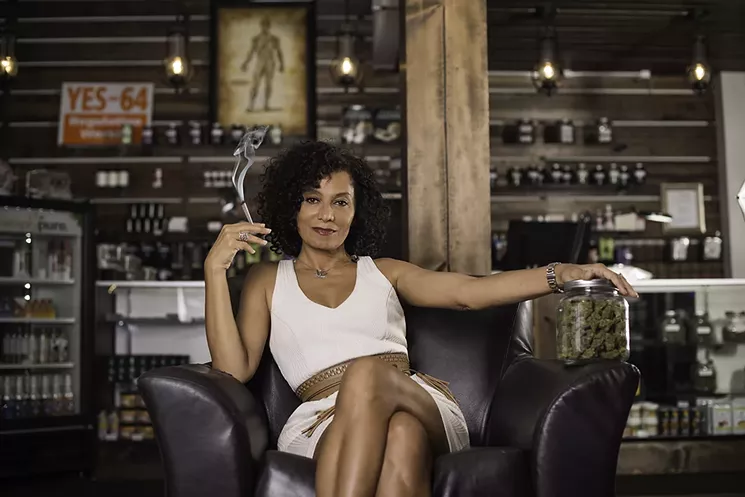
Wanda James has been a local business owner and political force for over a decade.
Courtesy of Wanda James
“What I talk about the most here is the opportunity to have proximity, and using that proximity to help others,” James says. “Let’s be clear: Arzelle worked tirelessly in getting his father out of prison. He did all of the heavy lifting and hard work. But I was able to elevate a bit with Jared’s chief of staff and Jared to take a harder look at why Harris should not have served 96 years for a nonviolent drug charge.”
Although Colorado has the least disproportionate rate in the country when comparing marijuana arrests for white and Black people, the latter were still about four times more likely to be arrested for possessing pot than white people from 2010 to 2018, according to the ACLU. And then there are people like Harris, whose nonviolent cannabis crimes were used by prosecutors to get him a 96-year sentence for cocaine possession.
“I think there are a lot of people who have gotten habitual-offender charges because of weed,” Grossman says. “The drug charges are a huge source of unfairness, especially for Black and Brown communities.”
According to the Last Prisoner Project, an organization dedicated to the release and re-entry of cannabis prisoners, over 40,000 people are in prison across the country for cannabis convictions, or received extended sentences because of previous cannabis charges.
Polis has expressed a desire to reverse those trends, but progress has moved slowly. Last year, the Colorado Legislature gave the governor the right to pardon convictions for possession of up to 2 ounces of marijuana. Polis used his pardoning power last October, automatically clearing over 2,700 past pot convictions involving possession of up to 1 ounce. While the legislature’s action allowed him to go to 2, he noted that current state law limits recreational marijuana possession to 1 ounce.
“So much cannabis is being legally sold here on a daily basis. Congrats to Colorado for selling over $2 billion worth of it last year. It just seems absurd that anyone is in jail or still has their long sentences after old cannabis charges,” James says. “It’s pretty amazing to me that we’re still in a place where we’re still talking about this. It’s a shame we have to have legislation behind it. Mass incarceration is a direct result of cannabis prohibition, and I think ending this immediately is something that goes hand in hand with the cannabis industry.”“The drug charges are a huge source of unfairness, especially for Black and Brown communities.”
tweet this
In the meantime, though, freedom comes one case at a time, and James was pushing this one hard. Not only did she want Harris’s application to be approved, but she wanted him out of prison before Christmas.
It was close. On December 23, Harris got a call from Lewis: Polis had approved and signed his clemency application, and he would be coming home in less than a month.
Father and son were reunited on January 15. Lewis waited for Harris outside of the Limon prison, eager to see his dad as a free man for the first time in over twenty years.
“He told me he was going to get me out,” Harris says. “He was passionate about getting me out, and I’m grateful and thankful for that.”
Harris’s freedom might not have come so soon — or at all — if not for a motivated point guard of a son and a deep bench of players. But if more cases like Harris’s come to light, James suggests, maybe that will create more momentum for mass action.
“We can help start to set precedence on these types of cases and start shining light on how horribly unjust Fred’s sentence was,” she says. “I think a lot of Americans believe our justice system isn’t biased and is fair and equitable. I think situations like this clearly point out that inequitable situations are still happening in our criminal justice system. Proximity is the real power in America, when you can call a governor or a governor’s chief of staff. I’m not saying they wouldn’t have taken a look at it otherwise, but being able to elevate something and having those relationships is that proximity that is so important to the African-American community right now.”
Right now, Lewis and Harris are enjoying their new proximity to each other. They spend much of their time in Lewis’s studio and office off South Santa Fe Drive, the headquarters for SweetFeet, BAC Magazine, a future shoe store and plenty of other projects rolling around in Lewis’s ambitious mind.
Harris, regularly decked out in SweetFeet gear that feels much more comfortable than prison garb, is still trying to adjust to life on the outside. His lessons range from learning how to use an iPhone to not standing at attention so often in public.
After being incarcerated for two decades, Harris acknowledges that he would be “lost, probably homeless without his son,” he says.
“I still don’t know how to navigate. He’s shown me a lot, though. I’m still sort of institutionalized. He has to remind me all the time to not do certain things,” Harris explains. “I know a guy who was 84 years old and he has nobody, and he’s up for clemency. He’s got nowhere to go. Some guys don’t want to get out, because they don’t have anyone.”
But having someone comes with its own baggage. The closer Lewis got to freeing his father, the more he had to work out his feelings regarding all those years without him. Harris had paid his debt to society for breaking the law, but that didn’t make up for being an absent father.
“I’ve definitely taken my frustration out on him before, but I’ve had to learn the biggest lesson through this, and that’s forgiveness,” Lewis says. “In order to become a champion and live out that model, then I truly have to be the bigger person.”
They have plenty of time to bond as Harris works for Lewis’s various brands and businesses. His prison printing experience is well-suited to magazine production, and he’s a good ambassador for SweetFeet, working to keep young toes warm in the winter. Thanks to the nonprofit, over 4,000 kids in Denver and another 10,000 around the country have stylish kicks — Nikes, Jordans, Adidas and other popular athletic shoes — and Lewis, who’s taken to calling himself the “Shoe Man,” has big plans for the nonprofit. He wants to create characters to represent the brand, and has a SweetFeet alter-ego ready for Harris: “Shoe Release.”
The two share another area of interest: cannabis.
The same 2020 law that gave Polis the power to pardon small cannabis offenses also created a definition for social equity licenses in the state’s pot industry. To qualify, applicants must prove that they or their families were negatively impacted by the War on Drugs, that they earn less than 50 percent of the state median income, or that they come from a community designated as a low-economic opportunity zone by the state. Harris and Lewis easily qualify in the first category.
Lewis is now considering applying for a cannabis business license, for a business he’d run with his father. While Harris can’t use cannabis because he’s still on parole, both he and Lewis believe that commercial weed could be in their future.
Lewis may not think that he reached his true potential in basketball, but jump shots and wingspan don’t always fulfill a man’s destiny: Seeing Harris grinning ear to ear, wearing a fresh pair of Nikes and a SweetFeet hoodie, proves that.
“He made me a part of this now,” Harris says.
In the long run, defense always wins.



